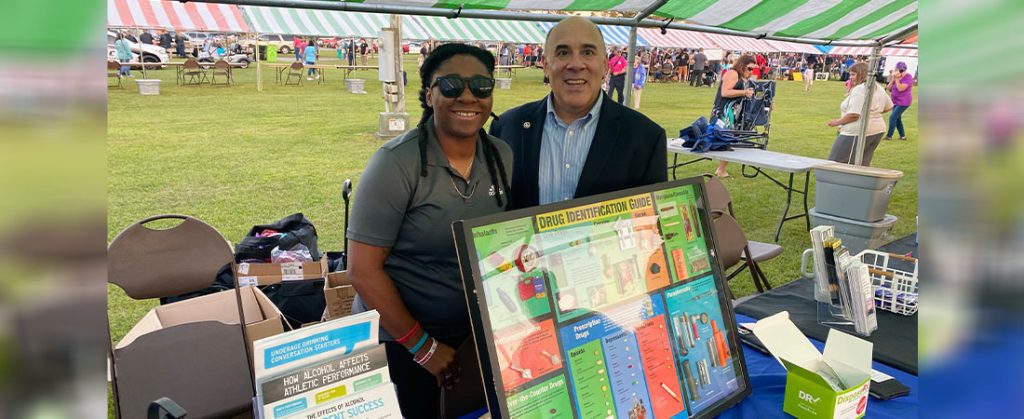
Craven County has opened a new department to enhance its response to area deaths and overdoses associated with the ongoing opioid abuse epidemic.
According to a county press release, the Craven County Opioid Epidemic Response was established to reduce opioid-related overdoses and deaths in Craven County through prevention, collaboration, harm reduction, treatment, short-term and long-term recovery, and recovery support services.
The new department, which is located at 2822 Neuse Boulevard in New Bern, was created when the county combined its Opioid Task Force developed in 2017 with national Opioid Settlement Funds.
Colonel Eric T. Lund was named as the Craven County Opioid Epidemic Response’s Opioid Program Manager on October 2. Lund will be responsible for ensuring Craven County complies with requirements established by the Memorandum of Agreement between the State of North Carolina and Local Governments on Proceeds Relating to the Settlement of Opioid Litigation (NCMOA).
Lund retired as a colonel after serving as a physician for more than 27 years in the U.S. Army, including tours of duty in Bosnia-Herzegovina and two 12-month tours in Iraq. After his military career, Lund served two years as the Director of the Integrated Disability Evaluation System at Fort Bragg (now Fort Liberty), providing disability evaluations for wounded, ill and injured soldiers.
In addition to Lund, the Opioid Epidemic Response department includes Jasmine Canady, Craven County opioid outreach coordinator, and Amber Parker, Craven County human resources director.
Craven County is set to receive roughly $15.5 million over the next 18 years as part of the state’s share of the national opioid settlement with distributors and manufacturers.
According to information presented at the June 29 Craven County Opioid Epidemic Response Annual Meeting, the county is estimated to receive $15,557,608 between 2022 and 2038. The county has already received $1,116,187 of that amount for fiscal year 2022-23.
The NCMOA establishes guidelines for the use of those funds as well as reporting requirements.
“Craven County’s opioid settlement award sounds like a lot of money, and it is a lot of money, but considering the number of citizens affected by this epidemic, the cost of treatment and services, the length of time recovery can take to achieve, the number of different services individuals with substance use disorder may need assistance with, and the number of years it can take to realize the type of change we need to see from prevention strategies, that settlement money will not solve the problem alone,” Parker stated.
Craven County is currently set to select from the Option A evidence-based strategies listed in Exhibit A of the NCMOA. Canady described Option A: High Impact Opioid Strategies, as a “don’t reinvent the wheel” plan that includes evidence-based addiction treatment such as methadone and other medications approved by the FDA.
Among other services, Option A also includes:
-Funding for peer support specialists and case managers hat connect individuals to services.
-Recovery housing support for programs that offer housing for those in treatment or recovery.
-Employment-related services such as job training, resume building, interview coaching, job transportation, and clothing,
-Distribution of the drug Naloxone which is used to reverse opioid overdose.
-Post-overdose response team that can reach out to individuals 24-72 hours after an overdose to connect them to support services.
-Programs that provide syringes, Naloxone, Fentanyl test strips and other harm reduction supplies.
-Addiction treatment for incarcerated persons in detention centers or prisons.
The Craven County Board of Commissioners adopted its first resolution for local spending authorization of opioid settlement funds on August 7. That resolution authorized funding $152,548 for Collaborative Strategic Planning, including funding the Opioid Program Manager position and program as well as funds to contract with Recovery Alliance Initiative (RAI) to complete the 14-Step Collaborative Strategic Planning process to allow Craven County to have the flexibility to consider Option B strategies listed in the NCMOA.
The resolution also authorized $25,000 for Naloxone Distribution; $200,000 for a countywide Post Overdose Response Team to be provided by the CarolinaEast Foundation; and $244,500 for Recovery Housing Support to be provided by Reviving Lives Ministry, Hope Mission, and The Healing Place of New Hanover County.
Based on data from North Carolina emergency room departments, Craven County ranks eighth in the state in terms of the percentage of opioid overdose ER visits from June 2022-May 2023 based on population.
Craven County residents seeking assistance with opioid use disorder or those in need of general prevention information can visit cravencountync.gov/opioid or call 252-636-7262. For more information visit morepowerfulnc.org/opioid-settlements.
By Todd Wetherington, co-editor. Send an email with questions or comments.

